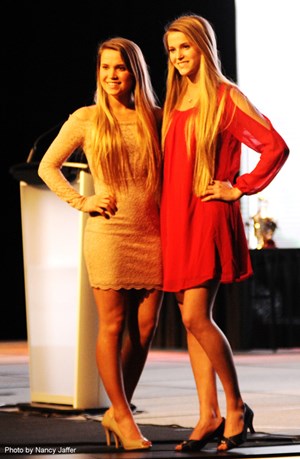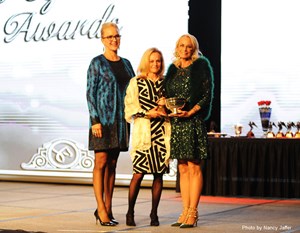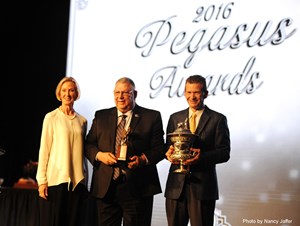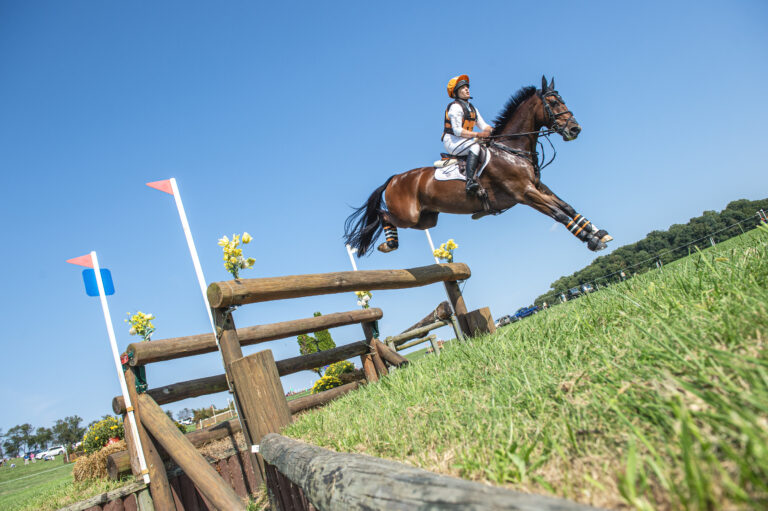January 15, 2017 — Five days ago, the U.S. Equestrian Federation unveiled a transformative strategic plan in an artfully produced two-hour presentation. (In case you missed it, read the details in Wednesday’s bulletin here.)
Now the organization has to make good on a lot of promises and initiatives, some of which—increasing membership, better service, making showing more accessible to “everyday” people, improving showing conditions–we’ve heard before over the years. So here’s the question as the USEF gets its second wind for a second century: Can the staff and leadership continue at full speed ahead to get it done?
“It’s been an incredible pace all year,” acknowledged USEF CEO Bill Moroney, who took the job last January and now is working with newly installed president Murray Kessler, a dynamo whose enthusiasm was contagious during the convention.
 New U.S. Equestrian Federation President Murray Kessler and Judy Werner, who has been involved with the organization’s governance since 1980, toast its 100th anniversary and a new beginning. (Photo copyright 2017 by Nancy Jaffer)
New U.S. Equestrian Federation President Murray Kessler and Judy Werner, who has been involved with the organization’s governance since 1980, toast its 100th anniversary and a new beginning. (Photo copyright 2017 by Nancy Jaffer)“Fortunately, everybody in the organization has been game to jump in,” Bill continued.
“We do have a lot of people who have been through a lot of change. When they go through so many changes over so many years, it’s hard to believe in the next group that comes in. I have to say to their credit, they’re believers; they’ve stepped up and said, `We feel the energy, we feel the focus changing.’”
The new mantra (oh, and USEF now is “branded” as U.S. Equestrian) emphasizes the emotion of being involved with horses, through the “Discover the Joy” campaign that should appeal to those who love or ride the animals but may not compete.
I spoke about that concept with Vicki Lowell, USEF’s new chief marketing and content officer (you also know her as president of the Washington International Horse Show). Click on the right-pointing arrow to watch a video of our chat.
The lively Ibach sisters from Charlotte, N.C., have become part of the Joy campaign. Madison, 17, and Reagan, 15, are serving as “ambassadors” to spread the word about U.S. Equestrian.
 Could they be any cuter? Of course not. Madison and Reagan Ibach are among the new, young U.S Equestrian “ambassadors” spreading the word about spreading the joy. (Photo copyright 2017 by Nancy Jaffer)
Could they be any cuter? Of course not. Madison and Reagan Ibach are among the new, young U.S Equestrian “ambassadors” spreading the word about spreading the joy. (Photo copyright 2017 by Nancy Jaffer)“The joy that the horses bring us is absolutely incredible and something all riders, regardless of age level and discipline, can relate to,” said Madison, who is involved with dressage.
Reagan enjoyed show jumping, but when her quarter horse, Cowboy, went lame, she tried a different direction rather than putting him out to pasture.
“Liberty horsemanship has kept us connected,” she explained.
“He knows all sorts of tricks,” continued Reagan, who gets infinite pleasure from being his partner in a new way.
“It’s definitely a reason the joy campaign ties in so well with what we do,” she said.
On another level, introduction of the strategic plan offers an opportunity for fence-mending and solving issues that long needed rectifying.
One of the conflicts USEF and its predecessors have faced over the years is the divide between the glamorous international disciplines and the national breeds and disciplines, which are the bulk of the organization’s affiliates.
I discussed the situation with Cynthia Richardson, past president of the Arabian Horse Association (it’s the third-largest USEF affiliate, but about a quarter of its membership does not belong to USEF.) Cynthia, who is also a member of the USEF board, hopes that under the strategic plan, the national affiliates can get more recognition.
As we talked, she recounted what happened at the affiliates’ roundtable a year ago, when representatives of those organizations gathered for a meeting to discuss their status. Click on the right-pointing arrow to hear her comments about what’s happening now.
I asked how she sees things going forward with USEF. Cynthia replied, “I think they recognize how much we provide to this association. I think we have our foot in the door. We just have to make sure we don’t become invisible again.”
Rob Burk, CEO of the U.S. Eventing Association, put it this way, echoing a lot of other people with whom I spoke during the meeting when he said: “I’m cautiously optimistic.” So many things happened at the five-day session that I can’t recount them all. But highlights include the emphasis on improving shows.
While it’s been made simpler for exhibitors to comment about conditions at shows (the form has gone from five pages to three questions) inspections by personnel trained to evaluate shows likely will provide the greatest impetus for improvement. Though standards have been in the rulebook for years, no show ever has been disciplined for violating them, according to information from the strategic plan presentation.
Horse welfare and safety of both horse and rider also are paramount. The USEF handles this on many fronts, though perhaps the most visible involves drug testing to insure “a level playing field.” Murray emphasized how important it is to stop the cheaters. A hot topic at the convention (and elsewhere) was the announcement that two people prominent in the hunter industry had gotten stiff penalties under new guidelines for charges that they showed a horse who tested positive for the calming agent GABA.
The lawyer for trainer Larry Glefke and the horse’s owner/rider, Kelley Farmer, said they had not shown up at a hearing on the charges because they had not gotten notice of a possible violation, but the USEF maintained that it had evidence the message was delivered. Stay tuned for more on this one.
The convention’s traditional two evenings of awards never disappoint, but this year there were more meaningful speeches than in the past, I thought. It played right into the strategic plan’s emphasis on the emotional connection between people and horses.
At the Pegasus awards, given on Friday night, Debbie McDonald accepted the Richard E. McDevitt Award of Merit for the late Parry Thomas with his daughter, Jane, but she struggled to hold back tears and as a result decided not to speak.
 It was an emotional moment as the late Parry Thomas, a key sponsor of dressage, was honored with the Richard E. McDevitt Award of Merit. Accepting from Elizabeth Goth were Parry’s daughter, Jane, and Debbie McDonald, who rode his horse, Brentina, and to whom he was a mentor. (Photo copyright 2017 by Nancy Jaffer)
It was an emotional moment as the late Parry Thomas, a key sponsor of dressage, was honored with the Richard E. McDevitt Award of Merit. Accepting from Elizabeth Goth were Parry’s daughter, Jane, and Debbie McDonald, who rode his horse, Brentina, and to whom he was a mentor. (Photo copyright 2017 by Nancy Jaffer)Parry, who died last year, was a major dressage sponsor and patron. He supplied horses for Debbie and her protégé, Adrienne Lyle, that took them to the Olympics and the World Equestrian Games. When Debbie and Adrienne were at his farm in Idaho, Parry would come over to the stable every day with his wife, Peggy, owner of the great Brentina. He enjoyed seeing the horses so much he was watching them on live stream the day he died.
“I got so emotional because he meant that much,” said Debbie after she was back at her table.
“I can’t describe how much I miss him.”
The indomitable Lizzy Traband received the Ruth Meredith Junior Equestrian of the Year award, and got a standing ovation for her speech. Born without a left hand, she nevertheless did everything she wanted with horses, from trick riding to show jumping
While people would never pick her out of a 10-person lineup as the one most likely to ride, she pointed out that the horses don’t see that she is missing a hand.
“They only see my spirit, heart and attentions…and the joy I experience when I’m with them,” she said.
The highlight of the Pegasus Awards is always the presentation to the Lifetime Achievement winner. This time it was Larry Langer, a California show organizer who has done it all—riding, coaching, officiating and managing shows, including the jumping competition at the Atlanta Olympics.
 The Lifetime Achievement Award was presented to Larry Langer by USEF President Chrystine Tauber and show organizer Tom Struzzieri. (Photo copyright 2017 by NNancy Jaffer)
The Lifetime Achievement Award was presented to Larry Langer by USEF President Chrystine Tauber and show organizer Tom Struzzieri. (Photo copyright 2017 by NNancy Jaffer)But most of all, he’s a mighty volunteer, serving both the USEF and U.S. Hunter Jumper Association.
As he talked about the “wow” moments in his life, he vowed repeatedly, “and I’m not done yet.” That’s good news for the many ventures that need him.
His childhood riding teacher, 83-year-old Ann Grenci, came up from Florida for his special night, I got the two of them together on video for some reminiscence. (Click on the right-pointing arrow to see the video)
Chrystine Tauber, the USEF’s outgoing president, also was honored for her years not only with the organization, but everything she’s done with horses. That includes riding with the U.S. Equestrian Team, course designing, judging, serving as the U.S. team’s chef de mission at the 1984 Olympics and elsewhere, and so much else. The next day, the board gave her an L.V. Harkness scarf as a going away present (she’s known for her many scarves) and Chrystine wiped tears away as she stepped down from the top post.
On Saturday night, the Horse of the Year Awards Gala was a chance for people in dozens of categories to claim ribbons and trophies they earned with their animals. The national and international horse of the year honors also were bestowed. The national award went to the gray hunter Catch Me, ridden by Scott Stewart.
 A portion of the U.S. Equestrian Federation’s impressive trophy collection that was on display during the Horse of the Year Awards Gala. (Photo copyright 2017 by Nancy Jaffer)
A portion of the U.S. Equestrian Federation’s impressive trophy collection that was on display during the Horse of the Year Awards Gala. (Photo copyright 2017 by Nancy Jaffer)In accepting the trophy, owner David Gochman told “a story of faith and hope.”
He revealed the horse was so sick from botulism at one point that they considered putting him down, but caretaker Terrence Prunty insisted the gelding could get better, and so he did, in a big way.
Olympic eventing individual bronze medalist Phillip Dutton won the Horseman of the Year honors Friday night and his Games mount, Mighty Nice, took the International Horse of the Year trophy at the gala the next evening.
But Phillip couldn’t be on hand, because his stepdaughter, Lee Lee Jones, was hospitalized with a head injury after a pre-Christmas horse fall. He and his wife, Evie, remained at her bedside in Delaware. Annie Jones, Lee Lee’s grandmother, accepted for him, dedicating the honor to her granddaughter and the late Bruce Duchossois, who bought Mighty Nice for Phillip.
Next up for me is a trip to Florida at the beginning of February, whenI’ll be covering the Winter Equestrian Festival’s Eventing Showcase, the show jumpers at the Wellington Masters and 5-star dressage at the Adequan Global Dressage Festival. Be sure to check back then; we’ll be posting lots of pictures on Facebook, and I’ll be scribbling a bunch of postcards to fill you in on what’s going on.
Until then,











